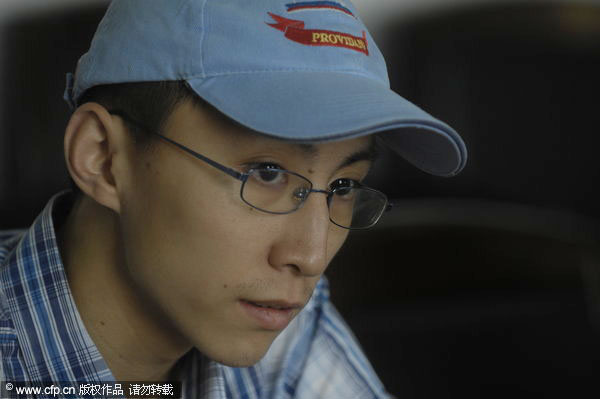Math wiz's rise to professor raises eyebrows
Updated: 2012-03-23 17:13
(Xinhua)
|
|||||||||||
CHANGSHA - At the tender age of 22, Liu Lu has become China's youngest full university professor, an honor usually bestowed upon acclaimed academics 20 years his senior.
But the baby-faced bespectacled Liu is not a nobody. In 2010, as a junior university student, he grabbed the academic world's attention by solving "Seetapun Enigma" -- a mathematics conjecture first put forward by British logician David Seetapun in the 1990s.
 |
|
Liu Lu, a graduate school student and China's youngest full university professor at Central South University in Changsha, March 19, 2012. [Photo/CFP] |
However, eyebrows have been raised since he was promoted to full professor status as a graduate school student on Tuesday at Central South University (CSU) in the Central Chinese city of Changsha.
The university also gave Liu a grant 1 million yuan ($160,000) for his achievement.
The news has been a hot topic on Sina Weibo, the country's popular microblogging service, over the past three days. And an online opinion poll shows that, by Friday afternoon, 74.7 percent of the 8,481 respondents support the rare promotion, agreeing with the notion that age is not a problem when it comes to honoring talent.
But still, 1,274 people considered the decision a bit reckless, more like a "show" put on by the school.
In China, a person usually needs to secure a doctoral degree and teach for at least 15 years at a university to be considered eligible for full professor status.
Liu has largely kept silence about the promotion other than saying he felt "pressured but would continue to follow his interest in mathematics."
CSU President Zhang Yaoxue, who personally announced the promotion, said the school authorities hoped the honoring would give Liu greater access to research resources and exchange with experts worldwide.
"It is not a hasty decision," Zhang said. "It is a credit to a student who managed to solve world-class academic problems."
Indeed, Liu's solution of "Seetapun Enigma" was submitted to the Journal of Symbolic Logic, an international academic publication of the field, and won applause from the journal's editor, Denis Hirschfeldt, a math professor at the University of Chicago.
In an earlier interview with local media, Liu said he acted on "a flash of inspiration" to solve the math myth, but he was not born a genius. Rather, his understanding of math was built on long-time accumulation of knowledge, he claimed.
Professor Hou Zhenting, Liu's current mentor for his doctoral program at CSU, backed the young boffin's promotion.
"Talents come in different ways. So maybe we should not be bound by formality in terms of appreciating talent," said Hou, a leading Chinese mathematician and recipient of the 1978 Rollo Davidson Prize, a major international award given annually to early-career probabilists.
In the eyes of his classmates, Liu is an "academic boy" who buries himself in books and research, skipping dinners and forgetting to sleep when he focuses on solving a math problem.
"He seldom talks with roomies and he does not play computer games like others," his classmate Liu Yang said.
Liu's promotion was also controversial in the way that it contradicted Chinese education's traditional obsession with test merits.
CSU president Zhang said Liu was not a good student in the traditional sense that his exam scores were mediocre or even below average. Liu simply spent a lot of time developing his interests, Zhang said.
China has produced a number of internationally acclaimed academics such as mathematician Chen Jingrun in the past, but the country's exam-oriented education has been under fire for its focus on imitation and cracking various exams rather than nurturing innovation and critical thinking.
Anxious parents force their children, sometime from pre-school age, to attend various classes ranging from piano to mathematics in order to stand out in school exams or talent competitions for children, as described in Amy Chua's controversial 2010 book "Battle Hymn of the Tiger Mother."
But Liu did not have good scores in high school and never attended any advanced math class, an extra-curricular activity commonly taken by Chinese students showing early achievement in the subject.
Liu was ranked near the bottom for the entrance exam for senior high school in his hometown in northeastern Dalian city, according to media reports.
"If I could give only one piece of advice to high school students in China, it is to focus on your interests but never exam scores," Liu was quoted as saying.
Today's Top News
President Xi confident in recovery from quake
H7N9 update: 104 cases, 21 deaths
Telecom workers restore links
Coal mine blast kills 18 in Jilin
Intl scholarship puts China on the map
More bird flu patients discharged
Gold loses sheen, but still a safe bet
US 'turns blind eye to human rights'
Hot Topics
Lunar probe , China growth forecasts, Emission rules get tougher, China seen through 'colored lens', International board,
Editor's Picks

|

|

|

|

|

|





